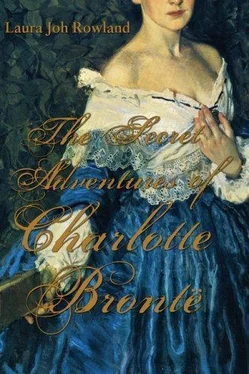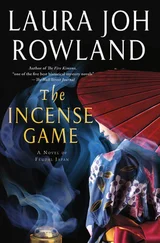Laura Rowland - The Secret Adventures of Charlotte Bronte
Здесь есть возможность читать онлайн «Laura Rowland - The Secret Adventures of Charlotte Bronte» весь текст электронной книги совершенно бесплатно (целиком полную версию без сокращений). В некоторых случаях можно слушать аудио, скачать через торрент в формате fb2 и присутствует краткое содержание. Жанр: Исторический детектив, на английском языке. Описание произведения, (предисловие) а так же отзывы посетителей доступны на портале библиотеки ЛибКат.
- Название:The Secret Adventures of Charlotte Bronte
- Автор:
- Жанр:
- Год:неизвестен
- ISBN:нет данных
- Рейтинг книги:5 / 5. Голосов: 1
-
Избранное:Добавить в избранное
- Отзывы:
-
Ваша оценка:
- 100
- 1
- 2
- 3
- 4
- 5
The Secret Adventures of Charlotte Bronte: краткое содержание, описание и аннотация
Предлагаем к чтению аннотацию, описание, краткое содержание или предисловие (зависит от того, что написал сам автор книги «The Secret Adventures of Charlotte Bronte»). Если вы не нашли необходимую информацию о книге — напишите в комментариях, мы постараемся отыскать её.
The Secret Adventures of Charlotte Bronte — читать онлайн бесплатно полную книгу (весь текст) целиком
Ниже представлен текст книги, разбитый по страницам. Система сохранения места последней прочитанной страницы, позволяет с удобством читать онлайн бесплатно книгу «The Secret Adventures of Charlotte Bronte», без необходимости каждый раз заново искать на чём Вы остановились. Поставьте закладку, и сможете в любой момент перейти на страницу, на которой закончили чтение.
Интервал:
Закладка:
“Then you won’t investigate Miss White’s death any further?” I said, alarmed by his apparent intention to dismiss the murder as the work of a stranger impossible to locate. Tremors wracked my body, Anne blotted perspiration from my forehead, and I feared I would be sick at any moment.
“I shall refer the matter to my superiors,” Constable Dixon said pompously, “and if they think any investigatin’ is in order, it shall be done. Now, if you’ll excuse me, Miss Bronte?” He touched the brim of his hat in farewell, adding, “You’d best get yourself to bed. You’re lookin’ a bit poorly.”
I must interrupt my account of what happened to me after Isabel White’s death and direct attention towards another segment in the tapestry of my story. Reader, look away from poor Charlotte Bronte huddled on her chair, and focus your mind’s eye upon the crowd in Paternoster Row. Do you discern one man who observes the proceedings with particular interest? He is perhaps thirty-five years of age, his lean, strong figure clad in dark coat, trousers, and hat. The features of his lean, swarthy face have the proud sharpness of a falcon’s; they are framed by unruly black hair. Do you see his eyes-a brilliant, crystalline grey in hue-fixed hard upon me?
I was too preoccupied to notice him and did not learn until later that he was there. His name is John Slade, although some people-including myself-knew him by various other names. Mr. Slade, having listened to the exchange, watched my sister lead me into the Chapter Coffee House. His countenance betrayed no reaction to what he had witnessed. He hurried from Paternoster Row, hailed a hansom cab, and rode along Fleet Street and the bustling Strand, through Covent Garden, and alit in Seven Dials. Along the narrow, tortuous cobbled streets, soot-blackened windows gazed like blind eyes from grimy, crumbling tenements. Deep open gutters reeked of excrement; rats and stray dogs foraged in rubbish tips. Seven Dials is a place of despair, and none live there but the desperate.
Mr. Slade cast his brilliant grey glance around him. Toothless old women sat on stoops; waifish children swarmed; beggars and vagrants wandered, and a man wheeled a cart full of bones and rags. After ascertaining that no one was watching him, Mr. Slade walked up the steps of a tenement and through the open door. A dim hall stank of urine and cabbage. Rude speech, babies’ cries, and the clatter of crockery emanated from the many rooms. He climbed the rotting stairs to the attic and tried the door. When he found it locked, he took from his pocket a picklock, opened the door, and entered the room, shutting himself inside.
A sloped, bare-raftered ceiling and stained plaster walls enclosed a bed, a chair, and a dresser. Light seeped through a small, grimy window. Mr. Slade spied a carpetbag patterned with red roses standing on the worn floorboards. He dumped the contents on the bed. He briefly examined, then set aside, a woman’s garments. Wrapped in a fringed, India silk shawl he found a ticket for a ship scheduled to sail for Marseilles the next day. He searched the dresser, then looked under the bed and the mattress and behind the furniture; he scanned the walls and the ceiling for cracks, and he tested the floor for loose boards.
He found nothing.
Mr. Slade cursed under his breath. Then he made the bed, replaced the furniture, and repacked the carpetbag. He departed the room, locked the door, hurried outside, and caught another cab to a tavern near Exchange Alley.
The Five Coins Tavern is a haunt of minor bankers and merchants; it occupies an ancient brick and plaster building with crooked timbers. A sign over the window depicts a jester juggling coins. That day, a lone customer sat at a table, a glass of wine before him. As Mr. Slade approached him, the man looked up. He was of middle age, with high, square shoulders, colorless hair, arched eyebrows, and a nose as sharp as an accusation. He pulled a gold watch from his embroidered waistcoat, then looked at the timepiece and pointedly at Mr. Slade.
“Sorry for my tardiness, Lord Unwin,” said Mr. Slade. He sat opposite the other man.
“You had better have a damned good excuse,” Lord Unwin said in an affected, aristocratic drawl.
The publican came over, and Mr. Slade ordered whiskey. When he and Lord Unwin were once again alone, Mr. Slade said, “Isabel White has been killed.”
Lord Unwin’s eyebrows arched higher. “Well, you did suggest that such at thing might come to pass. How, precisely, did it happen?”
Mr. Slade described the stabbing in Paternoster Row. The publican brought Mr. Slade’s whiskey and departed. Lord Unwin raised his wineglass and said, “May she rest in peace.”
He and Mr. Slade drank. Lord Unwin sat silent for a moment, his manicured hands encircling his glass, his head bowed, then he fixed his shrewd, colorless gaze on Mr. Slade. “A case of murder means an official inquiry.”
“Not this one,” Mr. Slade said, and explained how the constable deemed Isabel White’s stabbing a botched robbery not worth investigating.
“How fortunate that the law is so cooperative.” Lord Unwin smirked. “It wouldn’t do for anyone to connect us with Isabel White and draw the wrong conclusions.”
“No one will,” Mr. Slade said. “As far as I know, there’s no evidence of any business between us and Isabel White.”
Lord Unwin’s eyes narrowed. “What about the book?”
“The police didn’t find it on her. Nor was it in her room. It’s gone.”
“If it exists at all, and is more than just a figment of your imagination.” Lord Unwin’s thin lips twisted into a sneer.
“It exists.” Mr. Slade took another drink.
“By the by,” Lord Unwin drawled, “I have news for you. A message from Birmingham came this morning. Joseph Lock is dead.”
“What?” Shock jolted the exclamation out of Mr. Slade. “When? How?”
“Steady, my good man, steady now.” Lord Unwin made a calming gesture, but his eyes gleamed with spite. “Yesterday, Mr. Lock put a bullet into his head. It seems that your options are disappearing in rapid succession.”
Mr. Slade clenched his jaws. With Joseph Lock and Isabel White dead and the book missing, he faced the ruin of the most important venture of his life.
“Just how do you plan to finish the job now?” Lord Unwin demanded, but a tinge of apprehension colored his authoritative bluster.
“There was a witness to Isabel White’s murder,” Mr. Slade said. “Her name is Charlotte Bronte. She and Isabel traveled together on the train from Yorkshire to London. Perhaps Isabel told Miss Bronte something of value to us.”
“Then you had better pursue Miss Bronte, hadn’t you?” Lord Unwin pushed aside his glass. He took from his pocket a thick envelope and flung it across the table to Mr. Slade.
Mr. Slade inspected the banknotes in the envelope, then rose. He and Lord Unwin exchanged a stare of mutual dislike and reluctant conspiracy. “I fully intend to,” he replied.
6
Who was John Slade? What had he been to Isabel White, and what were his intentions regarding me? The answers to those questions will emerge in due course. For now I shall resume my own story.
In my room at the Chapter Coffee House, I vomited into a basin for the fourth time since Isabel’s death. Anne held my head, which pounded with thunderous pain. Finally I lay back on the bed, exhausted from my violent reaction to the trials of the past two days.
“Poor Charlotte,” Anne said, gently wiping my face with a damp cloth. “I’m sorry that you are suffering so badly.”
Sallow dusk glowed through the windows. The room was hot and stuffy. The Chapter Coffee House had once been a haunt of booksellers, publishers, writers, and critics. Later it became an inn frequented by university men and country clerics who were up in London. My father, who had stayed there during his days as a divinity student, had brought Emily and me here when he took us to school in Belgium. But that morning, upon our arrival, the proprietor had informed us that the Chapter Coffee House seldom accommodated overnight guests at present. Seeing our distress, he had graciously allowed us to stay and given us this dingy room upstairs. The inn was an empty, desolate place.
Читать дальшеИнтервал:
Закладка:
Похожие книги на «The Secret Adventures of Charlotte Bronte»
Представляем Вашему вниманию похожие книги на «The Secret Adventures of Charlotte Bronte» списком для выбора. Мы отобрали схожую по названию и смыслу литературу в надежде предоставить читателям больше вариантов отыскать новые, интересные, ещё непрочитанные произведения.
Обсуждение, отзывы о книге «The Secret Adventures of Charlotte Bronte» и просто собственные мнения читателей. Оставьте ваши комментарии, напишите, что Вы думаете о произведении, его смысле или главных героях. Укажите что конкретно понравилось, а что нет, и почему Вы так считаете.












